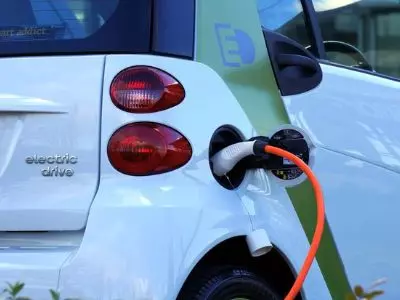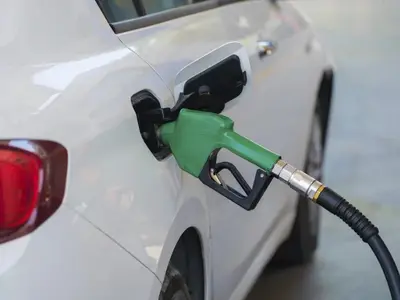With scientists increasingly warning about climate change and the impact of global warming, it’s time to think about greener alternatives.
This includes greener alternatives to fossil fuels for cars.
Many consumers have either already invested in more eco-friendly vehicles or are beginning to think about replacing their fossil fuel-burning cars.
We take a closer look at the 5 eco-friendly fossil fuel alternatives for cars that are currently available.
Alternatives to Fossil Fuels for Trucks and Cars

The 5 eco-friendly fossil fuel alternatives for cars are:
- Hydrogen
- Electricity
- Biodiesel
- Ethanol
- Scientifically Advanced Fuels (Algal Fuel)
Keep in mind there are many other alternatives to fossil fuels for transportation in the works, but these are the most popular.
Hydrogen
Hydrogen is a promising fuel to replace fossil fuels for many cars as it can be produced using renewable energy sources, and it burns cleanly with no emissions.
This alternative fuel source can go a long way to help reduce air pollution causes and effects.
However, there are currently only a few hydrogen fueling stations, and hydrogen cars are expensive.
Because of those limitations, hydrogen as an alternative to fossil fuels for cars is a challenging fuel for consumers to use at the moment.
Currently, hydrogen is primarily used for:
- Large fleets with a central filling station
- Vehicles where eliminating harmful emissions is important
- Experimental cars sold to consumers in selected markets
Though, as more hydrogen infrastructure is built, it is likely this alternative fuel will become more prominent.
Additionally, Hydrogen has the advantage of being easy to load quickly into a car, eliminating the need to charge a battery.
Here is a video exploring hydrogen cars:
Hydrogen Fuel Cells
Some cars burn hydrogen directly, using flammable fuel to produce power that moves the car’s wheels.
Many cars, though, use hydrogen to power a fuel cell that produces electricity which goes into an electric motor.
These Hydrogen fuel cells are promising because they allow hydrogen to be used to power electric cars.
Manufacturers may be able to produce electric cars in the future and then retrofit hydrogen fuel cells to those cars to provide fossil-fuel-free electricity.
Hydrogen fuel cells could also be used in the future to charge electric cars in a person’s home, eliminating the need for carbon-intensive electricity from the power grid.
Electricity

Electric vehicles are one of the most promising alternatives to fossil fuels in cars and have several advantages over traditional gasoline cars.
For starters, these vehicles are much more efficient, meaning they use less energy to travel the same distance as gasoline cars.
Electric vehicles also emit far less pollution than gasoline cars, and they have the potential to be powered by renewable energy sources.
However, electric vehicles also have some disadvantages:
- Electric vehicles are currently more expensive than gasoline cars.
- Most electric cars have shorter ranges than gasoline cars.
- Electric vehicles require a reliable and robust infrastructure of charging stations.
Electric cars are also easier to manufacture than gasoline cars, making it easier for startups and small companies to begin producing new, innovative models.
That said, electric cars are limited by the availability of batteries and advanced electronics and these batteries are not cheap to replace.
New battery technologies may help to eliminate these issues with electric cars and to extend their ranges.
Solar Power and Electric Cars
To ensure that electric cars are greener than fossil fuel-powered cars, they must be charged using electricity that is not generated by fossil fuels.
One way to accomplish this is to charge electric vehicles using solar panels.
Many consumers find one of the pros of solar energy includes installing rooftop solar panels to charge their electric cars, ensuring that their cars truly are fossil fuel free.
Biodiesel

Biodiesel is a fossil fuel alternative that has already been in widespread use since 1991.
Biodiesel is made from renewable resources like soybean oil, canola oil, and used cooking oil, and it can be used in any diesel engine without modification.
The great thing about Biodiesel is that it can be produced locally, supporting small farmers and local economies, with a much lower carbon footprint than fossil fuels.
One disadvantage of biodiesel is that there are limited sources of cooking oil to produce green fuel.
However, as the demand for biodiesel grows, more companies are likely to enter the market to provide raw materials.
Here are some of the biggest advantages of biodiesel:
- Because biodiesel fuel can be used in any diesel engine, consumers don’t need to buy a new car in order to use biodiesel.
- Biodiesel can power larger trucks and big vehicles, which are often hard to power with electricity and other fossil fuel alternatives.
Ethanol
Ethanol is another biofuel that can be produced with existing technologies and can be used in many vehicles without modification.
Ethanol is made by fermenting sugars from a variety of plant sources and is often blended with gasoline to create a less polluting fuel.
Some advantages of ethanol include:
- Ethanol is renewable and can be made from plant waste products like corn stalks.
- Ethanol burns cleaner than gasoline, resulting in less pollution.
- Ethanol can be less expensive than gasoline depending on how it’s produced, making it an attractive option for consumers.
However, there are also some disadvantages to using ethanol as an alternative to fossil fuels.
- The production of ethanol requires a lot of energy, which negates some of the environmental benefits.
- Ethanol can damage car engines if it is not used properly.
- Ethanol production can compete with food production, driving up food prices.
Is There Anything in the Future?
Although scientifically advanced emerging fuels are currently mostly still in the lab, these fuels offer a lot of promise for the future of clean energy.
One example of an emerging scientifically-advanced biofuel is algal fuel.
Algal fuel is produced by using special algae to produce energy from the sun, which is then converted into a fuel that cars and other vehicles can burn.
Algal biofuel is a promising future fuel because algae can be grown in a variety of environments.
The tiny plants can also be genetically modified to produce fuel efficiently.
Because people generally don’t eat algae, these fuels wouldn’t compete with food crops, as many biofuels do today.
That makes them an attractive alternative in a world with an increasing population and higher food needs.
That said, there are still several challenges with algal biofuels:
- These fuels are in an early stage, and many are still in the lab. It’s unclear when they might be available for commercial use.
- Scientifically advanced biofuels will likely be expensive, limiting their audience.
- The public may not accept the bioengineering that is often used to produce algal biofuels.
These fuels show promise, but much more research is needed before algal biofuels, and other advanced future energy sources are ready for consumer use.
List of Alternative Fuel Vehicles
Wondering which alternative fuel vehicles to consider?
Here’s a list of a few of the most popular alternative fuel vehicles in 2023:
- Tesla Model S
- Tesla Model 3
- Nissan Leaf
- Rivian truck (R1T)
- Rivian SUV (R1S)
- Toyota Mirai
- Chevrolet Bolt
The Teslas, Nissan Leaf, and Rivian vehicles all use electricity as their fuel.
The Toyota Mirai runs on hydrogen while the Chevrolet Bolt uses an electric motor with a small gasoline engine as a backup power source.
FAQ
What is the Best Alternative for Vehicles?
The best alternative fuel for vehicles is electricity.
Electric vehicles are less complex than gasoline-powered vehicles, making them easier to manufacture.
If the electricity for these vehicles is generated from green sources, then the vehicles will produce no greenhouse gases during operation.
Electric vehicles are also available with today’s technology, rather than more advanced vehicles, which may not be on the market for years.
What Alternative is Easiest to Convert Your Car?
The easiest fuel for conversion is biodiesel.
If you already drive a diesel vehicle, you can generally use biodiesel without any modifications to your existing vehicle.
If you drive a gasoline car, E85 ethanol is a good alternative if your vehicle supports it.
However, E85 ethanol still does have some fossil fuel in it.
Conclusion
Advanced technologies will likely make a major impact on transportation in the future.
Several options exist these days that provide viable and eco-friendly alternatives to fossil fuels for cars for consumers wanting to reduce their carbon footprint.
